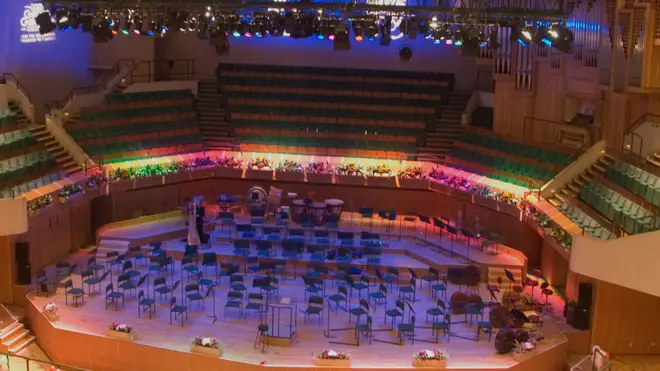On Air Now
Relaxing Evenings with Zeb Soanes 7pm - 10pm
7 September 2023, 15:11

Wales’ national concert hall has closed immediately due to investigations into potentially dangerous concrete confirmed to be in its ceiling.
The National Concert Hall of Wales has closed with immediate effect following the confirmation of RAAC, a potentially dangerous type of concrete, in its ceiling.
All shows at the venue have been postponed for the next four weeks while structural engineers complete tests on RAAC panels in the building.
Announcing the decision on its website, a statement from Cardiff Council reads: “St David’s Hall is to temporarily close to the public to undertake additional checks on the Reinforced Autoclaved Aerated Concrete (RAAC) panels in the building.
“The decision has been taken in light of the recent change to advice on RAAC in public buildings issued by the Health and Safety Executive (HSE) and following further discussions with the Council’s appointed independent structural engineers, and the council’s insurers.”
News of RAAC panels being reported in the concert venue’s ceiling made headlines earlier this week. The concern was sparked by the ongoing crisis surrounding more than 100 schools which have been closed or temporarily moved due to the potentially dangerous concrete being found in their buildings.
Read more: Wales’ national concert hall has potentially dangerous concrete in its ceiling, amid RAAC crisis
St David’s Hall will close with immediate effect for at least the next 4 weeks starting today (Thurs 7 Sept) to undertake additional checks on the Reinforced Autoclaved Aerated Concrete (RAAC) panels in the building.
— St David's Hall (@stdavidshall) September 7, 2023
More info can be found here: https://t.co/iYtXwNXDlL pic.twitter.com/amJE5iqvNB
The concert hall has been aware of RAAC in the building since 2021 when a condition report confirmed its presence. However, the council has reportedly said that throughout the past 18 months, there has been no evidence of deterioration.
“However,” the statement continued, “the Council has continued to engage with its insurers and expert structural engineers and, based on advice received today from those experts, we believe it is prudent and responsible to carry out intrusive surveys to further reassure ourselves and the public on the safety of the Hall.
“This will require drilling into panels to confirm their interior construction and to determine if any further work is required to ensure continuing safety. Consequently, we will be bringing structural engineers - who are RAAC experts - back on-site to do fresh tests on RAAC panels in the building.
“We expect this procedure could take at least 4 weeks, and we will look to re-open the Hall as soon as possible, dependent on any action which may or may not be required.”
RAAC gained popularity during the 1950s in Europe as a cheaper and lighter-weight alternative to concrete. However, due to a life expectancy of around 30 years, in August 2023 the UK government agency, the Health and Safety Executive announced that: “[RAAC] is now liable to collapse with little or no notice”.

St David’s Hall is due to transfer management from Cardiff Council to the Academy Music Group (AMG). As a prerequisite for the agreed takeover, AMG is expected to have to pay £38 million in remedial work due to maintenance issues within the concert hall.
At least five other theatres have closed across the UK due to the presence of RAAC being confirmed in their buildings. The National Theatre notably announced on Tuesday that they had also confirmed the presence of the potentially dangerous concrete in their backstage areas, but as of Thursday 7 September the theatre remains open.
The statement published on the Welsh concert hall’s website ended with an apology to its audience.
“We know this will cause a lot of inconvenience and disappointment, and we would like to apologise to all our customers, but we hope you will understand that the safety of audiences, staff, artists, volunteers, and everyone at the venue is paramount, and that the Council is obliged to act in response to the updated HSE guidance and expert advice.
“Thank you for your understanding and patience.”